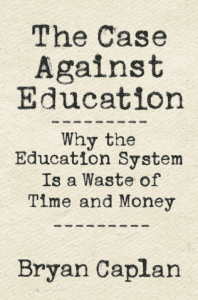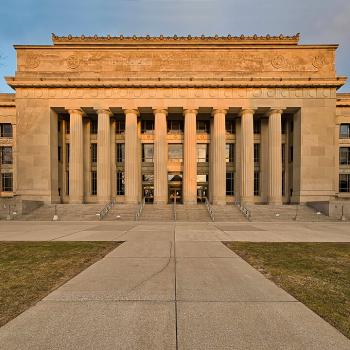In an era in which politicians like Bernie Sanders talk about making college “free,” Bryan Caplan — an economist across campus from me at George Mason University — suggests making it more expensive. From his vantage point, college is overhyped and too affordable, leading students to purchase educational experiences that will teach them few skills and will expose them to ideas in which they have no interest.
 Caplan makes a strong Case against Education. The title is a bit of a dodge. Caplan has no problem with education. He thinks individuals who want to should read Shakespeare and T.S. Eliot, ask questions about the universe, and watch Lord of the Rings. The subtitle of his book is the real argument: Why the Education System Is a Waste of Time and Money.
Caplan makes a strong Case against Education. The title is a bit of a dodge. Caplan has no problem with education. He thinks individuals who want to should read Shakespeare and T.S. Eliot, ask questions about the universe, and watch Lord of the Rings. The subtitle of his book is the real argument: Why the Education System Is a Waste of Time and Money.
His argument is that education is mostly signaling. Employers hire college graduates not because those potential workers possess particular skills, but because their completion of college and their attainment of good or at least decent grades suggests that they are reasonably competent and conformist human beings. College graduates, at the very least, have shown a certain amount of persistence and diligence.
Caplan accepts that college pays, in the sense that college graduates earn more than those without a diploma. Many studies make that point, which is why so many Americans entirely uninterested in learning pursue college degrees. Most people can’t get good jobs without the diploma. Caplan doesn’t argue that students do not learn any skills or acquire any human capital. They do, and they acquire more in some fields than others. He argues that the mix is about 80% signaling and 20% human capital.
Therefore, higher education is an enormous waste of time and money. There should be cheaper and more efficient ways of certifying that prospective employees are competent human beings who can follow instructions and meet deadlines.
Part of Caplan’s argument is that there is a “disconnect between curriculum and job market.” Most professors teach things that have no bearing on a student’s future employment. Poetry? Not very useful if you’re not becoming a poet or teaching literature. Biology? No more useful than poetry if you plan on working at the local historical society. Ethics? A hindrance if you’re going into politics. As Caplan points out, even many courses in a student’s major are not necessary for his or her future employment.
Now, the obvious objection to Caplan’s argument. Many of us do not think that higher education is job training. Especially given my location in the humanities, I value the liberal arts courses that until now has remained a core part of the curriculum at most American colleges and universities. I do hope my students come away with some skills. I want them to learn how to write error-free and even elegant prose, identify and critique the arguments embedded in the texts that they read, and learn how to articulate their opinions in an effective and non-cringeworthy manner. But I also want them to have transformative educational experiences. I want them to learn how to think historically, to learn that the present is a tiny slice of the human experience. I want them to become a bit more humble as they learn that human beings at other times and in other places have thought in radically different ways about the world.
Caplan has no problem with my pedagogical goals. The problem is that at many institutions, so few students share them. It’s like “herding rock fans into opera houses … not only futile, but cruel.” Caplan reports that “the vast majority [of students] are philistines. The best teachers in the universe couldn’t inspire them with sincere and lasting love of ideas and culture.” And most teachers are not the best teachers.
While I am too lazy to analyze his data, Caplan’s description of higher education rings true to me. I have taught at large, enrollment-driven, public universities. Most students take my courses because the university requires them to do so. A minority demonstrate a sincere interest in the subject matter, and it is not easy in the course of a single semester to make much progress on the skills I discuss above. Most students are checking off a requirement, and the university does not make those requirements too onerous because it wants students to enroll and graduate with the credential they need.
A few thoughts:
– While a large percentage of American collegians attends large, public, enrollment-driven institutions like the ones at which I have taught, many do not. American higher education still has a considerable amount of institutional diversity. Highly selective institutions demand much more of their students, which increases the chance of both skill acquisition and transformative experiences. My visits to both evangelical colleges and Brigham Young University (Provo) have brought me into classrooms in which a much higher percentage of students demonstrate an interest in the material. Liberal arts colleges almost by definition encourage students to place more value on a broad spectrum of courses.
– American higher education is way too expensive. Anyone paying for it will immediately agree. Even public state schools such as mine are expensive. About $12,500 for in-state tuition and fees each year. If you do not live locally, or if you have to pay for your own room and food, the price tag is much higher. Governments subsidize those costs through a variety of programs, all of which cost taxpayers a modest amount of money.
Caplan’s argument is that because education is mostly signaling and impractical, governments should spend much less money on it. As a libertarian, he supports the “separation of school and state.” While I’ve been discussing higher education, Caplan also thinks most of K-12 education is impractical. Schools should teach reading, writing, and math, and not bother with history or foreign languages. Students forget history. Americans are peculiarly incapable of learning to speak other languages, and everyone else in the world speaks English. When it comes to higher education, Caplan argues that we should “shut down the impractical departments at public colleges, and make impractical majors at private colleges ineligible for government grants and loans.”
I’m not averse to lower spending on education (my blood pressure rises when I look at usdebtclock.org), and I’m open to the argument that subsidies enable institutions to raise tuition and fees. Also, there’s obviously a lot of waste in terms of dormitories, gyms, and administrator salaries (faculty love to discuss administration bloat). Caplan argues that if education were much more expensive, fewer students would pursue it, and employers would find simpler and cheaper ways of identifying good workers.
As Chris has discussed on this blog, some state institutions are eliminating “impractical” departments such as history. Even many religious institutions are pushing practical job-training rather than the liberal arts.
As a historian currently housed in a Religious Studies department, it’s a bit hard for me to entertain Caplan’s argument about picking and choosing between the practical and impractical. While space doesn’t permit an extended defense of the liberal arts here, I think public investments in the humanities are as reasonable as public investments in apparently more practical fields. I think that most institutions are already way too focused on the practicality of higher education!
– Since I do not have much say over national, state, or local education policy, I’m more interested in how I as an individual faculty member should respond to The Case against Education. What should I do if few students are interested in my classes, and if most students will forget everything they encounter in them?
I could decide to focus more of my time on my scholarship and writing. I actually already spend a high percentage of my time on my writing! The standards for advancement at my own institution and in the field as a whole encourage me to do so. I do not think my conscience would permit me to devote less of myself to teaching.
Alternatively, I could follow Caplan’s suggestion that “passionate educators should redirect their energy to humans who are ready for enlightenment,” perhaps by blogging, podcasting, or making YouTube videos. I love speaking to our senior learners group at George Mason, and I love speaking to book groups and churches about the historical topics I study. So I’m all for this. No YouTube videos, though. While I’m free in 2020 and beyond for any local Mayflower society or any other venue interested in my forthcoming book on the Pilgrims and Plymouth Colony, that doesn’t eliminate the conundrum that The Case against Education poses for me.
Perhaps I should teach better? I could revise my syllabi more often, prepare more diligently, and spend more time working with students on their writing. Caplan reports that the best teachers still encounter swaths of apathy. If I teach more effectively, maybe another handful of students each year will receive some meaningful benefit.
It might sound meager, but I find this latter response compelling. The evangelist Dwight Moody compared his task to that of a ship’s pilot hoping to save a few of the drowning men who surrounded him. Likewise, I find satisfaction and meaning in teaching and mentorship if a few students have transformative experiences in my classroom, or if I play some part in their journey toward graduate school or a meaningful career. If a few more students had such experiences, I would find even more satisfaction in my work than I already do.













